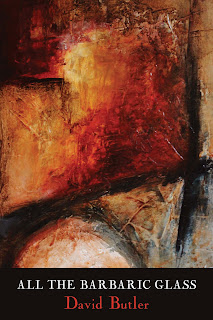All the Barbaric Glass by David Butler (Doire Press) was published in 2017. David is a novelist, poet and playwright. His novel City of Dis (New Island) was shortlisted for the 2015 Kerry Group Irish Novel of the Year. His first collection, Via Crucis, was published by Doghouse Books in 2011. David Butler's writing has won several prestigious awards. Most recently he was shortlisted in Trim Poetry Competition 2020 and he won The Maria Edgeworth Poetry Prize 2020. He lives in Bray with his wife and fellow author, Tanya Farrelly.
The collection could be divided into three sections, partitioned by 'Ten Miniatures', ten poems in which the eye or sight feature strongly. 'Only the lover and the artist/have such Medusa eyes' Butler says in Of Love and Language while in Harbour Miniature as the sun sets 'Everything wet or metal has been fired/and winks red-eyed at the dark'. Psyche states that 'We don't see what colours our lives have' in that we may not always see (see again) or recognise our souls, my interpretation at least. Death, or the trying to come to terms with the weight of living in its shadow or light features strongly in this book.
Rilke's quote '...man den Tod in sich hatte wie die Frucht den Kern' (you had your death inside you as a fruit has its core) is added beneath the title of the poem Family Album in the last section of the collection. On looking at a photograph of his mother and sister the poet wonders about the shadowy 'ghost-eye' of death. Death Watch describes the alienation and loneliness of dying, 'Mornings, solitude rises with him...Friends shy away'. In Restless, the final poem, Butler is not sure if he can see a body out on the sea or not, 'It's not, I say again, less sure...with sea and wind and world enormous about us'. This piece reminded me of Stevie Smith's Not Waving but Drowing in the way that poems sometimes answer each other.
Butler visits his parents in the first section of All the Barbaric Glass. In These are the Dead Days he finds 'your father a child again', belonging now to Alzheimer's, a 'Man of sand'. In Watcher he describes his mother 'ghosted in the pane' watching birds feed in the winter, 'the coal-tits, a robin/round as a bauble'. Throughout the book there are references to Greek myth. In 'Father', for example the failing mind is described as a maze, the Aegean appears in Exodus and in Minatory the Minotaur is conjured. Icarus appears in Icarus, a clever re-imaging of the ancient tale.
The Dogfish is my favourite poem in the volume. It looks unflinchingly at a fish washed up on the beach (this fish too becomes eyeless) and imagines the innocence of a child hearing for the first time 'the song of the sand;/the whisper in the hourglass'. I was reminded here of W.B. Yeat's To A Child Dancing in the Wind which is my favourite Yeat's poem. I also love Oghma's Gift where Butler imagines how the Ogham alphabet came into being.
Butler is at once a sailor on an ancient and a modern sea. His odyssey is epic in the sense that 'This is how it is to live' as he writes in And then the sun broke through. I like to think the voyage is worth 'sudden ochre out of a sullen ocean'. It is what the explorers and mariners hoped for, the 'hunger' that 'impelled them/to cast fortune to the winds' described in Cartographers. Yet the poet has no interest in unseeing reality, the 'spores' left behind, perhaps this is why the eye features so strongly in the collection. He does though realise in the first poem Breaking, from which the title of the collection is taken that 'There are times you need/to step outside the colloquy;/to mute the looping newsfeed'. Hell yeah, I say to that!
The poet's ability to weave the minutiae of concepts with precise words into verse is formidable as demonstrated in Mellifont Abbey where a hive of bees become a monastic order, and the poet's mind again questions faith. Butler is a powerful commander of language. In Wordplay he says 'Sometimes, stark as a wood-cut, a word/stamps the world...and a poem hits its mark'. It is certainly true that Butler is no average archer. All the Barbaric Glass is an ambitious, admirable, carefully cut work which has given me a lot to think about.




No comments:
Post a Comment